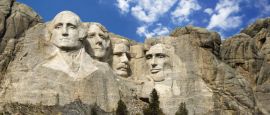United States of America: Doing business & staying in touch
Doing business in United States of America
American business culture tends to be direct, informal, and time-conscious, with an emphasis on efficiency and results. Punctuality is important—arriving late to meetings is generally seen as unprofessional, and time-wasting is frowned upon. Meetings often begin with a brief exchange of pleasantries but get down to business quickly.
Communication is typically straightforward and assertive, and it's acceptable to express opinions openly, even with senior colleagues. Business attire varies by industry and region: conservative dress (suits or smart business wear) is standard in finance, law, and government, while tech and creative sectors often lean towards business casual.
First names are used early and frequently, even in professional settings, and a firm handshake with good eye contact is the usual greeting. Titles and hierarchy exist but are often played down in favour of a collaborative atmosphere. However, decision-making tends to rest with those at the top, and proposals should be well-prepared and focused.
It's worth noting that date formats differ in the United States: the standard is MMDDYY, which can be confusing for visitors used to the DDMMYY convention. Additionally, paper sizes in the U.S. follow the American system—'Letter' size (8.5 x 11 inches) is standard, not A4. This can affect how documents are printed or displayed, so adjustments may be needed when working with American colleagues or printers.
Networking plays a key role in American business, and informal events—like business lunches or after-hours drinks—can be just as important as formal meetings. Follow-up emails and thank-you notes after meetings are appreciated and help reinforce a professional impression.
The United States has the world's largest economy, characterised by its diversity, innovation, and global influence. It is a highly developed, mixed-market economy driven by a strong private sector, robust consumer spending, and a tradition of entrepreneurship. The country is home to many of the world's most recognisable brands and leading multinational corporations, particularly in sectors such as technology, finance, healthcare, entertainment, and manufacturing.
The U.S. economy is also notable for its regional variation. Cities like New York serve as global financial hubs, Silicon Valley leads in tech and innovation, Los Angeles is a powerhouse of media and entertainment, and the Midwest remains a centre for agriculture and heavy industry. Meanwhile, energy production, including oil, natural gas, and renewables, plays a significant role in several states, notably Texas.
The country enjoys a relatively low unemployment rate (in normal conditions), a flexible labour market, and a high level of productivity. However, economic inequality remains a subject of ongoing national debate, with disparities in income, healthcare access, and educational opportunities.
Machinery and electrical equipment, aircraft and aerospace products, vehicles, pharmaceuticals and medical devices, agricultural products, oil and petroleum products, and services such as finance, software, education, and intellectual property.
Consumer electronics, vehicles, machinery and industrial equipment, pharmaceuticals and medical goods, clothing and footwear, crude oil and petroleum, and food and beverages.
Keeping in Touch in United States of America
Mobile phone coverage in the United States is generally good, especially in cities, towns, and along major highways. However, signal strength can be unreliable in remote or mountainous areas, such as national parks or rural regions.
The U.S. uses GSM and CDMA networks, with 5G coverage expanding in urban centres. Before travelling, check whether your phone is compatible with U.S. frequencies—most modern smartphones are.
Visitors can avoid high roaming charges by purchasing a prepaid SIM card from major providers like AT&T, T-Mobile, or Verizon. These are available at airports, mobile phone shops, convenience stores, and online. SIM packages typically include data, domestic calls, and sometimes international minutes. Some plans also support eSIM for compatible devices.
Public Wi-Fi is common in hotels, cafés, airports, and libraries.
Do note that public Wi-Fi networks are often unsecured, so it's wise to avoid online banking or sensitive transactions unless you're using a VPN.
Major national news networks include CNN, Fox News, MSNBC, and ABC, alongside respected newspapers like The New York Times, The Washington Post, and The Wall Street Journal. Local news is also widely available and often focuses on regional issues and weather.
Radio is popular across the country, ranging from talk radio and country music to hip-hop, jazz, and public radio. NPR (National Public Radio) is a notable non-commercial network with in-depth news and cultural programming.
Most hotels offer a wide range of cable or satellite TV channels, and streaming services such as Netflix, Hulu, and Amazon Prime are widely used—though access may be limited to those with U.S. accounts.
The United States upholds freedom of the press as a constitutional right, and it has one of the most open and diverse media environments in the world. Journalists operate independently, and media outlets are free to criticise the government and public figures without censorship.
That said, many media sources in the U.S. are privately owned and can reflect particular political or ideological leanings. For example, some networks and newspapers are seen as more liberal or conservative in tone or editorial stance. For balanced coverage, travellers may wish to consult a mix of sources or turn to public broadcasters like PBS or NPR, which aim for a more neutral perspective.









 You know where
You know where
